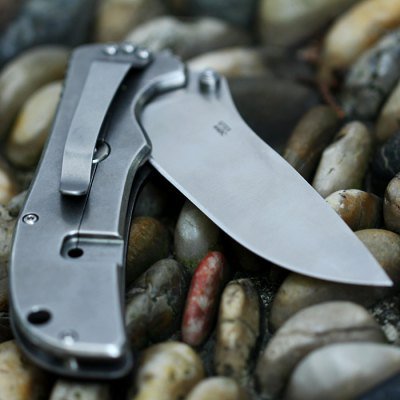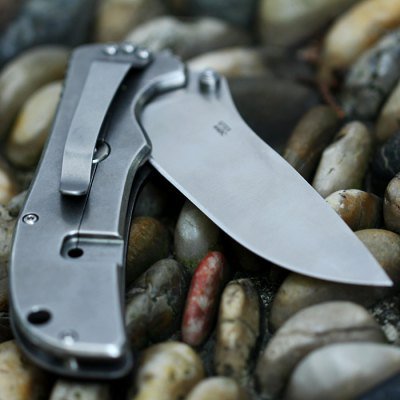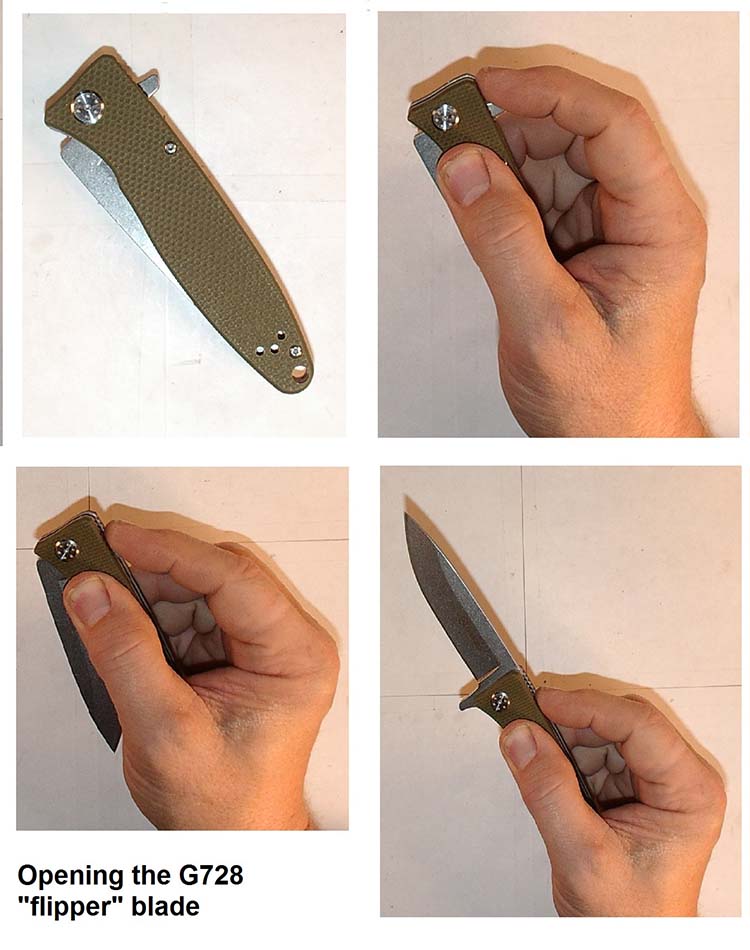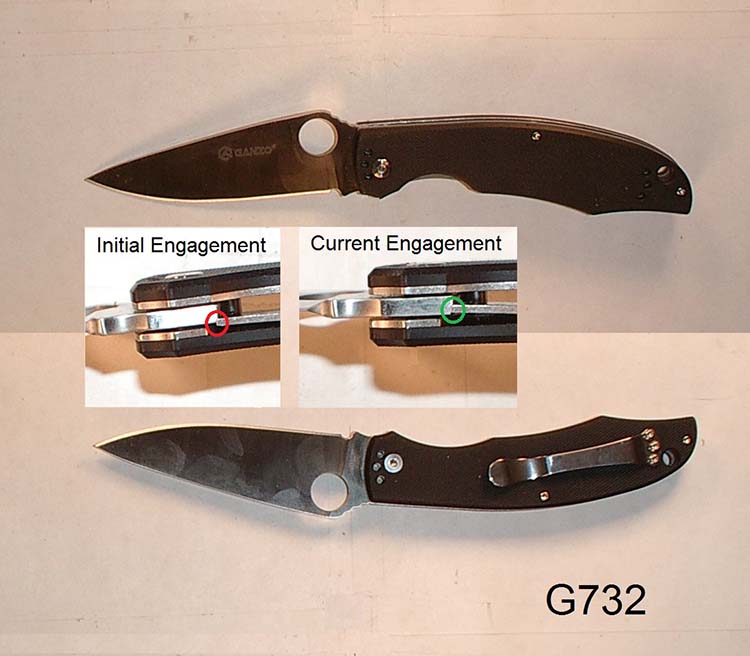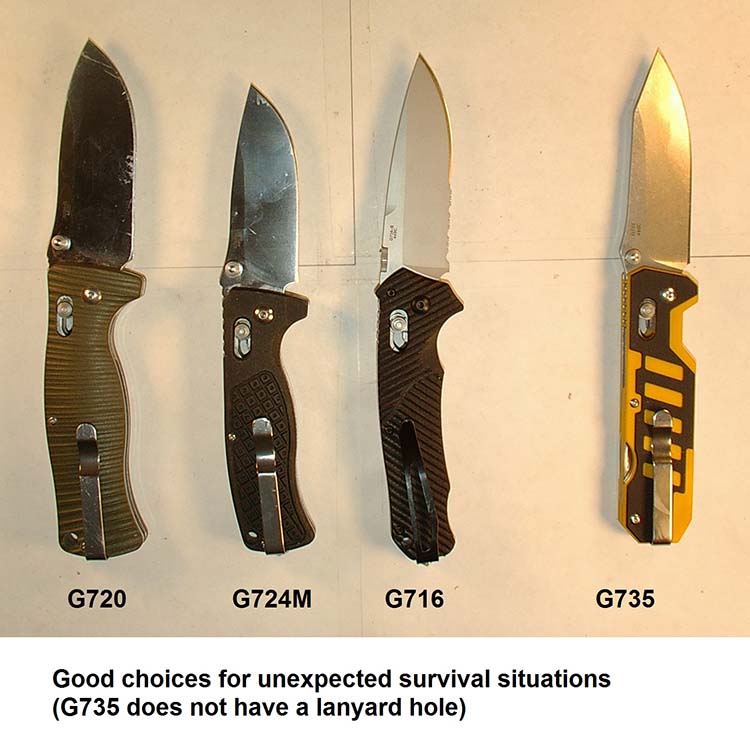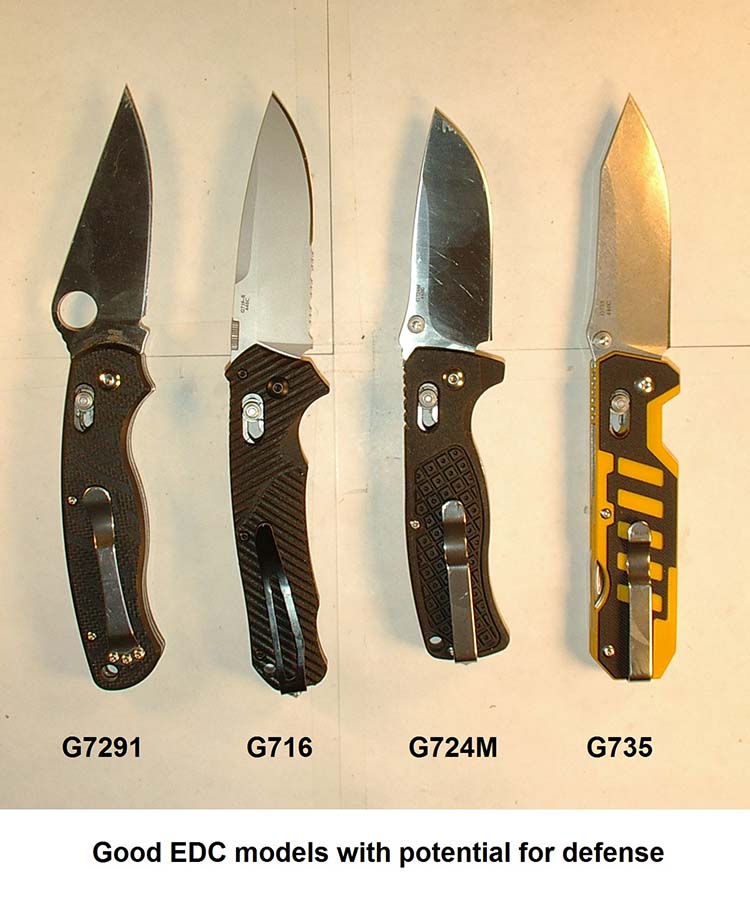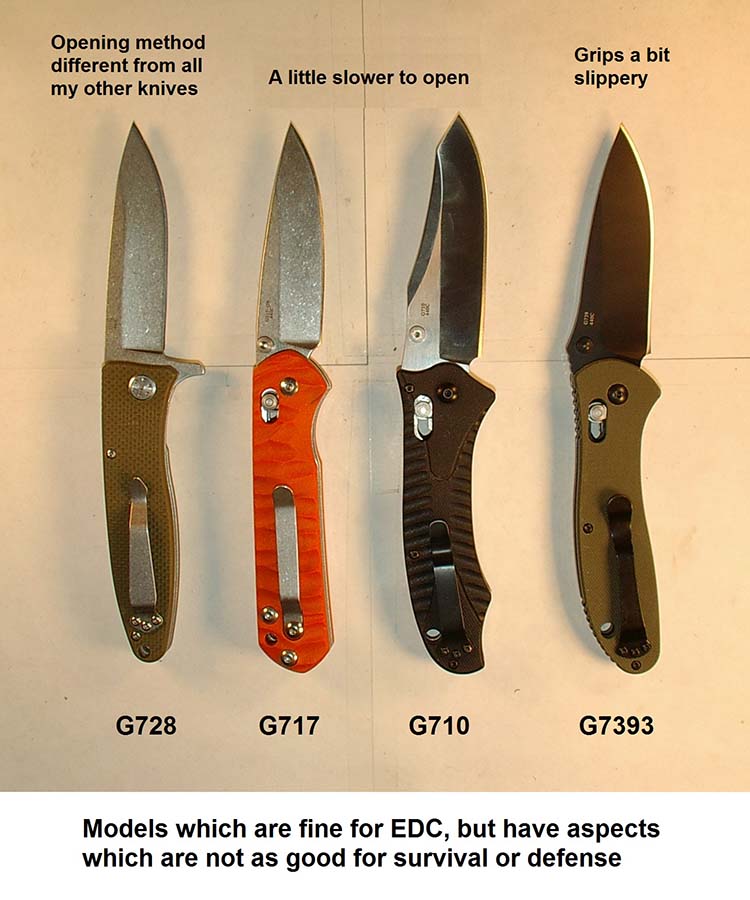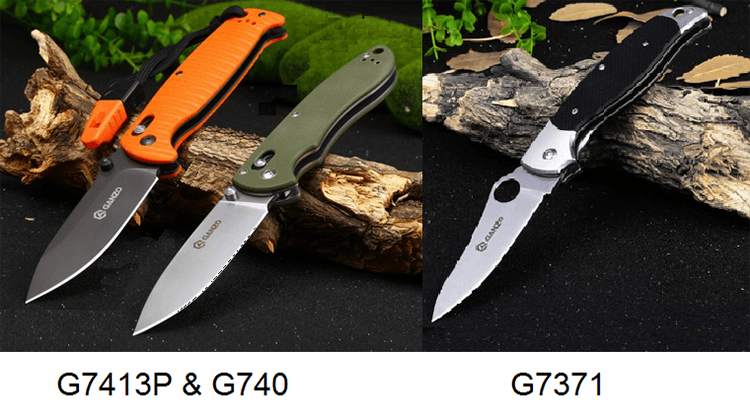Ganzo Folding Knives (Part 3)
Wrapping Up Our Three-Part Ganzo Series
In Part 1 we looked at the Ganzo G7xx(x) knife line from a high level. In Part 2 we looked at the Axis lock models. In this part, we will look at the liner lock models, as well as make some overall observations.
Note: To see the catalog page for any of the following models, click on the model number in the title.
Ganzo G723
This is a version of the liner lock known as a “frame lock”. It operates the same as the standard liner lock, but instead of being an additional leaf or part of the liner, the lock is part of the side panel. On this model, the clip can only be mounted tip down, for right-hand carry, which is not my preference.
This one looks rather interesting, but in addition to the clip limitation, the price is on the higher end of the Ganzo scale, and to facilitate the frame functioning as the lock, the entire left side of the grip is smooth metal, so might be too slippery. If it was only one of these quirks, or even two, I might have tried one, but with all three of these concerns, I decided to pass.
The blade shape is drop point, so should be pretty good for all survival and EDC uses. There appears to be enough clearance between the thumb stud and the grip that opening should be fast and reliable. I have never tried a frame lock knife, so have no clue how easy to close this one might be.
The clip is not the standard one, so I can’t say how well it works, although the smooth metal underneath it likely will help its functioning. There is a jimpped thumb ramp as well as jimping on the liner and grip scales, so it is quite possible that thumb retention will be good. The lanyard hole looks to be at least adequate.
| Blade Length | 9.5 cm | 3.74″ |
| Blade Width | 2.7 cm | 1.06″ |
| 1Weight | 0.180 kg | 6.35 oz |
Ganzo G728
Unlike the other models, this is opened using a “flipper”. This is a protrusion from the back of the blade, which you use to “flip” the blade open with your forefinger. There is some spring assist once the flipper “disappears” into the frame. If you are used to it, it works very well. But if you are used to opening the blade with your thumb, you will probably make a couple of useless gropes for that before remembering to use the forefinger.
Another advantage of the flipper is that when open, the flipper makes a pretty good guard. The blade shape is the optimal drop point and has a bit of a hollow grind with can help with sharpness and lighter weight, but detracts a little from the strength. Closing is pretty easy with the right hand; it will require some practice to do it with your left hand (the flipper actually makes it a bit harder than usual).
The clip is standard depth and not the best one, but better than the one on the G717. The grip panels have very fine checkering which does not provide much slip resistance, but the grip shape compensates for this somewhat. Jimping is restricted to the liners and grip panels and is mildly effective. As for the lanyard hole, it is just big enough for paracord and has only very slightly rounded edges.
| Blade Length | 8.8 cm | 3.46″ |
| Blade Width | 2.2 cm | 0.87″ |
| Weight | 0.127 kg | 4.48 oz |
Ganzo G730
Another “Spyderco-like” version, this has the blade hole for opening and the long, straight clip blade, and the good standard pocket clip. In addition, the pocket clip which can be mounted for tip up or tip down carry on either side. Since the G729/G7291 models have the same shape blade, and the G732 model is pretty much the same as this one except it has a drop point blade, I decided that trying one of this model would be unnecessary duplication.
| Blade Length | 9.0 cm | 3.54″ |
| Blade Width | 3.0 cm | 1.18″ |
| Weight | 0.129 kg | 4.55 oz |
Ganzo G732 and G7321
Ganzo seems to be on a “Spyderco” kick lately. These versions have the thumb hole for opening, but the blade is a drop point, which normally would be better for survival usage then the long straight clip. But in this case, the difference is so slight as to be insignificant, so this blade is not better for survival than the G729/G7291 blade.
They also have the good standard depth pocket clip which can be mounted for tip up or tip down carry on either side. It came mounted for tip down, which is not my preference, but can be easily changed – if you have a T6 Torx bit. The thumb hole makes for easy, reliable opening, and the liner lock is easy to close with the right hand, and possible to close with the left hand with some practice.
This is another model with the fine checkering which does not offer much slip resistance. It has jimping on an excellent thumb ramp, which works fairly well. The lanyard hole is nicely sized with rounded edges.
I did note a couple of times when the blade became “unlocked”, which is worrisome. It appears that the liner lock engaged less than 25% of it’s thickness. After opening/closing the blade several times, and using a screwdriver to push the lock leaf all the way to the other side (to verify no obstruction and possibly “re-spring” it), it now seems to engage more than 50%, and usually fully engages if the opening is full speed.
G732
| Blade Length | 9.5 cm | 3.74″ |
| Blade Width | 2.9 cm | 1.14″ |
| Weight | 0.126 kg | 4.44 oz |
G7321
| Blade Length | 8.8 cm | 3.46″ |
| Blade Width | 3.0 cm | 1.18″ |
| Weight | 0.122 kg | 4.30 oz |
Ganzo G734
These have the same sort of sheepsfoot blade style as the G733; the major difference is a liner lock instead of the Axis lock. All the comments about the G733 model apply to this one as well, including the decision to not get one. One other difference is that the clip may be mounted for tip up carry or tip down carry, but NOT switched to the other side for left-hand carry as most of the other models allow.
| Blade Length | 8.2 cm | 3.23″ |
| Blade Width | 3.2 cm | 1.26″ |
| Weight | 0.133 kg | 4.69 oz |
Survival Evaluation
I did not run these through my standard survival evaluation; the tests I did on the G717 and G720 in my original article (see the link to it in Part 1 of this article) convinced me that Ganzo knives can serve well for unexpected survival situations. For “expected” scenarios, of course, grab your fixed blade(s).
To excel for survival, a quality folding knife should be heavy duty, with a wide, drop point blade or equivalent, a strong tip, a good belly for skinning, a highly slip resistant grip, a good lanyard hole, and be able to be opened and closed-handed with either hand. The G720 leads the pack, with the G724M close behind.
The G716 is pretty good (non-serrated version in my opinion), and the G735 would be a top contender if it had a lanyard hole. The remaining models tend to have narrower blades and in some cases, grips that are not slip-resistant enough. They can serve but are not the best choices.
Defense Evaluation
A pocket knife can provide some degree of defense against man or beast (smaller animals, that is). As such, I paid most attention to the ease and reliability of opening, the shape of the blade, particularly a sharp tip, and the slip resistance of the grips. My favorite is the G7291; the G735 and G716 are also good choices.
The G724M is pretty decent, and the G728 is worth considering, but only if you exclusively use “flipper” knives. It is likely that if you use thumb-opening knives much, the chances of fumbling a flipper-style opening under stress are too great. The remaining models either had the opening stud too close to the liners for reliable opening under stress, or grip scales which were not slip-resistant enough for me.
Optimal EDC Knife: Balancing Utility, Portability, and Versatility
A knife which is carried “every day” must not only be useful, but easy to carry. Weight, size and “roundedness” were key, plus having a blade with moderately sharp tip. All except the G720 (size, weight and tip width) would do just fine. The G717 has difficulty being clipped to the pocket but is fine loose. Most discrete were the G7393 with a black clip and the G716 with a deep carry black clip.
My top two choices are the G724M (weighted towards survival) and the G7291 (weighted towards defense). The G716 (non-serrated version) and the G735 are also pretty decent for all three uses. The rest are good for EDC, but are not quite as “multi-functional”.
Ganzo Pocket Knives: Quality, Affordability, and Versatility
All the knives received have excellent quality, with the exception of the questionable lock on the G732. They also have an extremely affordable price, so it appears that the Ganzo G7xx(x) line, at least, provides exceptional value. These are good, sturdy knives, at prices that allow you to get several, so if one gets lost or stolen or just scooped up, or you need to equip a group, it won’t be a significant problem.
Ganzo pocket knives is that they are appropriate for EDC, and can be quite adequate for unexpected survival or defense situations. There are a couple of differences in requirements, so the best defense knife is different from the best survival knife, and optimizing either use can even conflict with what makes a good EDC knife; a wise compromise is usually the best choice.
The best compromise Ganzo has (so far) to cover these three aspects of knife use seems to be the G724M. Others that would serve well across at least two of the three aspects are the G7291 (best one for defense), G716, and G735. The G7393P might be a real contender for all three uses; the only negative in the G7393 I got was the lack of slip resistance of the grip scales, and the P model looks like it might overcome this single negative factor.
Introducing the Latest Ganzo Folding Knives Models: G740, G741, and More
Seven new models are now available in the market. The G740, G7412, G7412P, G7413, and G7413P seem to be quite similar to the G739x models, except for the grip shapes. The G741x models may have the grips with the best grip potential (having a bit of a hook at the pommel), but they may be hard on the pocket due to that same hook. They also come with a small whistle. And the G7371/G7372 is similar to the G734, with fancier grips.
Want to learn more? Follow us on Facebook and Twitter for the latest survival tips and news!
Save


